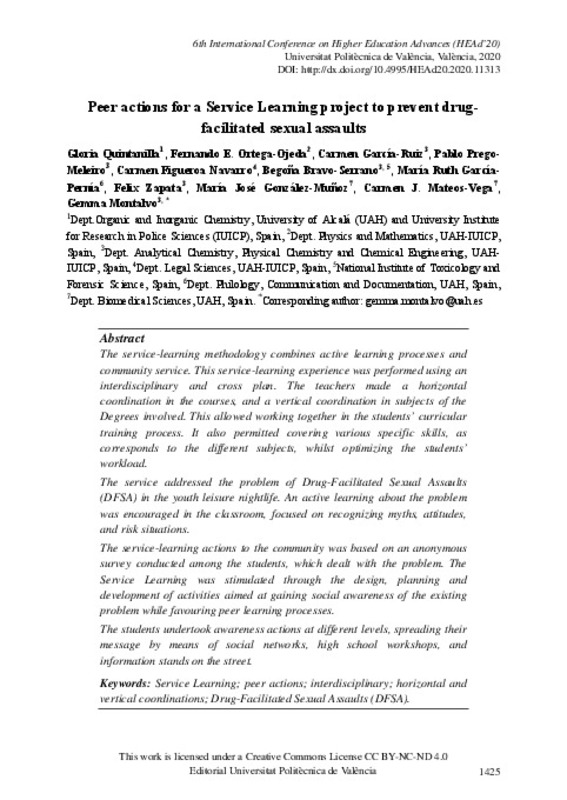JavaScript is disabled for your browser. Some features of this site may not work without it.
Buscar en RiuNet
Listar
Mi cuenta
Estadísticas
Ayuda RiuNet
Admin. UPV
Peer actions for a service learning project to prevent drug-facilitated sexual assaults
Mostrar el registro completo del ítem
Quintanilla, G.; Ortega-Ojeda, F.; García-Ruiz, C.; Prego-Meleiro, P.; Figueroa Navarro, C.; Bravo-Serrano, B.; García-Pernía, MR.... (2020). Peer actions for a service learning project to prevent drug-facilitated sexual assaults. En 6th International Conference on Higher Education Advances (HEAd'20). Editorial Universitat Politècnica de València. (30-05-2020):1425-1433. https://doi.org/10.4995/HEAd20.2020.11313
Por favor, use este identificador para citar o enlazar este ítem: http://hdl.handle.net/10251/145795
Ficheros en el ítem
Metadatos del ítem
| Título: | Peer actions for a service learning project to prevent drug-facilitated sexual assaults | |
| Autor: | Quintanilla, Gloria Ortega-Ojeda, Fernando García-Ruiz, Carmen Prego-Meleiro, Pablo Figueroa Navarro, Carmen Bravo-Serrano, Begoña García-Pernía, María Ruth Zapata, Felix González-Muñoz, María José Mateos-Vega, Carmen Montalvo, Gemma | |
| Fecha difusión: |
|
|
| Resumen: |
The service-learning methodology combines active learning processes and community service. This service-learning experience was performed using an interdisciplinary and cross plan. The teachers made a horizontal coordination ...[+]
|
|
| Palabras clave: |
|
|
| Derechos de uso: | Reconocimiento - No comercial - Sin obra derivada (by-nc-nd) | |
| ISBN: |
|
|
| Fuente: |
|
|
| DOI: |
|
|
| Editorial: |
|
|
| Versión del editor: | http://ocs.editorial.upv.es/index.php/HEAD/HEAd20/paper/view/11313 | |
| Título del congreso: |
|
|
| Lugar del congreso: |
|
|
| Fecha congreso: |
|
|
| Código del Proyecto: |
|
|
| Agradecimientos: |
Teaching Innovation projects UAH / EV951 and UAH / EV1024 of the University of
Alcalá; Research project MSCBS-PNSD-2018I032 of the Ministry of Health Consumption
and Social Welfare, National Drug Plan; IUICP2019 /06 ...[+]
|
|
| Tipo: |
|








